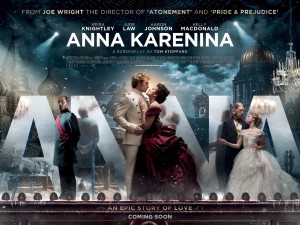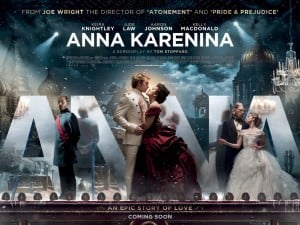Note 1: A version of this article was originally published in The Examined Life, the e-magazine of Wheatstone Ministries.
Note 2: The novel came out in 1878. This film has been out for months. I crave dispensation from spoiler alerts.
There hasn’t been an ideal time to review 2012’s Anna Karenina. Released two months apart, it earned $8.7 million in the UK (respectable given the market size) and $12.3 million in the US (which is weak).* Presumably the distributors are hoping for an awards season bump. They may have been hoping for a theatrical re-release, but initial box office, combined with Keira Knightley’s lack of nominations and the February DVD release, indicate which way the wind is blowing. So probably, this title will be expensive or in the discount rack. It’s too bad it didn’t do better, because this is a very good film.
If you haven’t read Leo Tolstoy’s Anna Karenina, it would be a shame to be introduced by anything but the novel. Regularly we see a movie before we read the book, which we read in translation, usually having skimmed Wikipedia for characters and plot. Alas. Few things compare to immersing oneself in hundreds of pages of Tolstoy — I can only imagine what it must be to read it in Russian — and he saturates his work with every aspect of nineteenth century Russia in a way for which there is no substitute. I don’t know how much Tolstoy is read any more, but few things are better than spending a week unbending one’s mind in Tolstoy’s vise.
Anna Karenina is not a tragic story, but Anna is an utterly tragic character, and the novel explores the deepest levels of human suffering and sin. It’s not for the faint of heart. Redemption and forgiveness are the greatest themes, but Tolstoy does not blanch from the psychic—soulish—agonies of depression, adultery, drug addiction, and suicide in which the greatest forgiveness and redemption may be found. Caveat spectator for Joe Wright’s adaptation, which shrinks from less of the book’s depravity and may glamorize more of it.
The British release proved a strong draw for Bright Young Things—presumably because the trailer fixates on the costumed Knightley getting swoony with a mustachioed dreamboat and runs the tag-line “You can’t ask why about love.” Happily this is the least-accurate promo ever. The film is a preciously-rare, unadulterated adaptation of the source, excepting the scenes of the fallen Anna and Vronsky that Tolstoy much better leaves off-stage. Tom Stoppard’s genius for adapted screenplay is married to Joe Wright’s directorial sensitivity. Miss Knightley carries the lead better than expected, and she is the weakest casting in a superb ensemble.
The real controversy about this adaptation is its doubling of the theatrical conceit.
Login to read more
Sign in or create a free account to access Subscriber-only content.
Topics:
